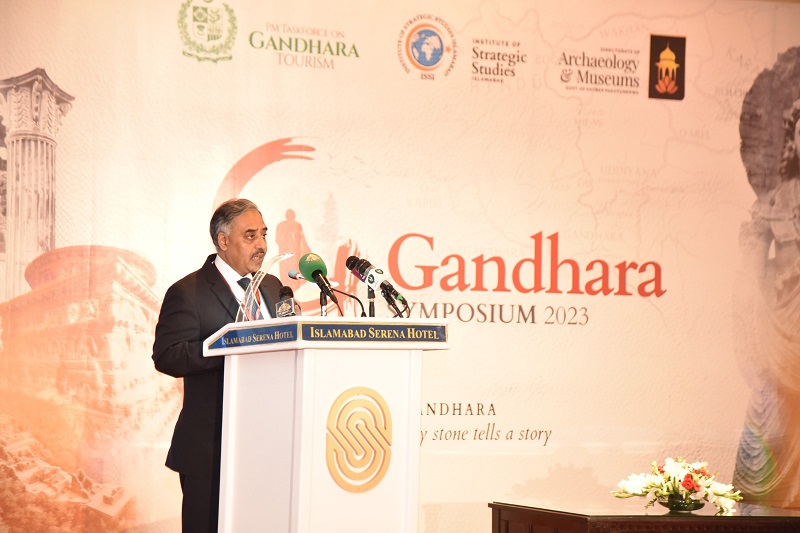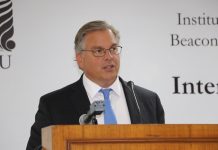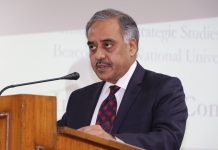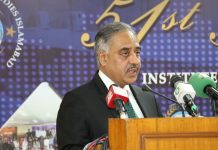Remarks of Director General ISSI Ambassador Sohail Mahmood at the
Inaugural Session of “Gandhara Symposium 2023 – Cultural Diplomacy:
Reviving Gandhara Civilization & Buddhist Heritage in Pakistan”
July 11, 2023

Honourable Mr. President,
Excellencies,
Respected MV Monks/Faith leaders,
Distinguished Guests,
Ladies and Gentlemen!
AoA and a very good morning!
It is a great pleasure to welcome you all to the Inaugural Session of this three-day Gandhara Symposium 2023.
We are privileged to have a distinguished group of dignitaries, scholars and experts joining us from different parts of the world, and from Pakistan, for this Symposium.
We are deeply honoured that His Excellency Dr. Arif Alvi, the President of the Islamic Republic of Pakistan, has taken the time out of his busy schedule and graced this occasion.
Our special thank are due to Dr. Ramesh Kumar Vankwani, Minister of State and Chairman, PM Taskforce on Gandhara Tourism, for his support and valuable efforts.
The Directorate of Archaeology and Museums, Government of KP, has been a strong partner in this joint endeavour and we thank Dr. Abdul Samad and his team for their tireless work.
Our own colleagues at ISSI, led by Dr. Talat Shabbir, have worked assiduously with all the relevant Departments and institutions – from the conception of the idea to its fruition.
Indeed, this is a multi-stakeholder enterprise and we are deeply grateful to everyone for their contributions. This, of course, also includes the Pakistan Missions Abroad and a number of Foreign Diplomatic Missions in Islamabad, who have lent their precious support in the organization of the Symposium.
Excellencies,
Distinguished Guests,
The primary objective of this Symposium is to increase the spotlight on the Gandhara civilization and raise global awareness about the rich Buddhist Gandhara heritage in Pakistan.
As we all know, the Gandhara civilization flourished mostly in the region that is present-day Pakistan, around the 269 BE, especially under the rule of King Ashoka.
Situated at the cross-roads of ancient trade routes, Gandhara served as a melting pot of diverse cultures and civilizations. It brought the East and the West together — embracing influences from ancient India, Persia, Central Asia, and the Hellenistic world.
Taxila, Peshawar, Swat, and Thakt-i-Bahi were among the major cities of Gandhara.
The remarkable civilizational fusion that Gandhara created presents a fascinating sight in these places.
The Gandhara region is full of magnificent archaeological sites. The iconic stupas and sculptures, characterized by their exquisite blend of Hellenistic and Indian artistic traditions, are testaments to the transcendent beauty of this ancient civilization.
Besides creativity, Gandhara exuded knowledge and understating, and radiated universal values for mankind.
Taxila with its famous University became the most well-known centre of knowledge of the ancient world.
Inspired by the teachings of Lord Buddha, values such as compassion, tolerance, peace and harmony became the hall-marks of this cultural space.
As such, while Gandhara represents an archaeological treasure trove, it also serves as a source of inspiration for humanity in today’s polarized world for putting a strong premium on peace and harmony.
Excellencies,
Distinguished Guests,
We also recall that the famous British archaeologist, Sir John Marshall, was among those pioneers who discovered the traces of Buddhist civilization in Gandhara, more than a century ago.
The government and people of Pakistan have always taken pride in the fact that this immense legacy, indeed a part of World Heritage, has been preserved with utmost care.
We are grateful to the UN bodies like UNESCO as well as institutions and personalities in the Buddhist world that have extended their invaluable support and assistance in this endeavour.
In the recent past, we have witnessed the placement of ‘peace bells’, a ‘rains retreat’, and meditation sessions at some of the sacred sites.
On these occasion, the Most Venerable monks from friendly Buddhist countries have visited Pakistan and spearheaded these activities. This process must continue to move forward.
The people of Pakistan reckon that they are heirs to millennia-old, multi-layered cultural heritage, of which Gandhara is one of powerful dimension.
This Symposium offers us an extraordinary opportunity to explore new avenues for the preservation, protection and promotion of the remarkable Buddhist Gandhara heritage.
On the one hand, this will enable us to fulfil our generational obligation of passing on this illustrious legacy to the future generations in sound and thriving condition.
On the other hand, it would show to the outside world the captivating civilizational dimensions of Pakistan, which tend to often get obscured in the prevalence of pressing issues of peace and security in the region.
It would also open up possibilities for enhanced tourism — a sector that is amongst the high governmental priorities, but the realization of whose potential remains sub-optimal.
The panel discussions, Round Table, and site visits during this 3-day Symposium would explore these themes in greater depth, and hopefully produce clear-cut recommendations and pathways to reaching these goals.
Let me conclude with a quote from Lord Buddha: “Go forth in every direction – for the happiness, the harmony, the welfare of the many. Offer your heart, the seeds of understanding, like a lamp and re-lit, illuminating the darkness.”
Let Gandhara inspire us to more vigorously pursue inter-cultural dialogue, foster better mutual understanding, and work together for peace and progress.
I one again welcome everyone to the Symposium and wish very productive deliberations over the next three days.
Thank you!















